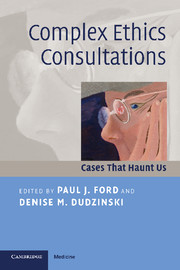Book contents
- Frontmatter
- Contents
- List of contributors
- Foreword
- Acknowledgments
- Introduction: Live and learn: courage, honesty, and vulnerability
- Part I Starting at the beginning: prenatal and neonatal issues
- Part II The most vulnerable of us: pediatrics
- Part III Diversity of desires and limits of liberty: psychiatric and psychological issues
- Part IV Withholding therapy with a twist
- Part V The unspeakable/unassailable: religious and cultural beliefs
- Part VI Human guinea pigs and miracles: clinical innovations and unorthodox treatment
- Part VII The big picture: organizational issues
- 25 It's not my responsibility
- 26 Intra-operative exposure to sporadic Creutzfeldt-Jakob disease: to disclose or not to disclose
- 27 Why do we have to discharge this patient?
- 28 Who's that sleeping in my bed? An institutional response to an organizational ethics problem
- Conclusions, educational activities, and references
- Index
28 - Who's that sleeping in my bed? An institutional response to an organizational ethics problem
Published online by Cambridge University Press: 03 May 2010
- Frontmatter
- Contents
- List of contributors
- Foreword
- Acknowledgments
- Introduction: Live and learn: courage, honesty, and vulnerability
- Part I Starting at the beginning: prenatal and neonatal issues
- Part II The most vulnerable of us: pediatrics
- Part III Diversity of desires and limits of liberty: psychiatric and psychological issues
- Part IV Withholding therapy with a twist
- Part V The unspeakable/unassailable: religious and cultural beliefs
- Part VI Human guinea pigs and miracles: clinical innovations and unorthodox treatment
- Part VII The big picture: organizational issues
- 25 It's not my responsibility
- 26 Intra-operative exposure to sporadic Creutzfeldt-Jakob disease: to disclose or not to disclose
- 27 Why do we have to discharge this patient?
- 28 Who's that sleeping in my bed? An institutional response to an organizational ethics problem
- Conclusions, educational activities, and references
- Index
Summary
Case narrative
Mr. Wiggins, 78, was admitted to our hospital for treatment of a stroke. His deficits included complete left-side weakness and slurred speech. His cognitive status was mildly impaired and he became frustrated and aggressive at times when unable to perform various activities. Indeed, Mr. Wiggins was dependent for all daily living activities, including hygiene and toileting. Although he completed his acute care and a period of convalescence, he did not regain any function on his left side.
Mr. Wiggins had maintained a very active lifestyle prior to the stroke. He and his wife of 53 years had lived together in their two-story home for over 40 years. Subsequent to the stroke and in consultation with the healthcare team, Mr. Wiggins and his family determined it would not be possible for him to return home. The family applied for placement in a nursing home. Per our institutional policy at the time, Mr. Wiggins and the family were invited to provide the names of three nursing homes. They selected St. Peter's as their first choice because this home was operated by their religious denomination. They also provided two other names.
After a three-month wait in acute care, a bed became available in one of the homes on the Wiggins family's list. However, it was not at St. Peter's, and the family subsequently declined this bed. Mr. Wiggins remained in acute care for an additional six months until a bed became available in their home of choice. In total, Mr. Wiggins remained in an acute-care bed for nine months after he was considered ready for medical discharge.
- Type
- Chapter
- Information
- Complex Ethics ConsultationsCases that Haunt Us, pp. 219 - 225Publisher: Cambridge University PressPrint publication year: 2008



